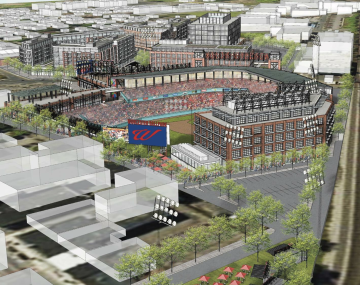Worcester Hires Architectural Firm to Design New PawSox Stadium
Wednesday, January 30, 2019
The City of Worcester announced that D’ Agostino Izzo Quirk Architects (DAIQ) and Sasaki to lead the design effort for Polar Park and the surrounding area.
The announcement comes less than a week after the City of Worcester released a video illustration of the ballpark.
“This process reflects an extraordinary union of world-class architects with local roots. To have an accomplished Worcester native as a lead architect on the ballpark, and to have an Olympic-quality architectural firm expand the reach of the ballpark into the Canal District, is an exciting marriage that continues Worcester’s ascent. With such intimate knowledge of Worcester, of Fenway Park, and our streets and parks, our City is poised to create a great ballpark and an even more vibrant downtown,” said Worcester City Manager Edward M. Augustus Jr.
GET THE LATEST BREAKING NEWS HERE -- SIGN UP FOR GOLOCAL FREE DAILY EBLASTThe principal in charge of Polar Park is DAIQ founder, architect, and Worcester native Tommy Quirk, AIA.
The park is scheduled to open in Worcester’s Canal District in April of 2021.
Developing the Park
DAIQ will provide architectural design services for the ballpark. Sasaki will focus on urban design and landscape architecture for the surrounding neighborhood as the City moves forward with plans to break ground for the public ballpark in July of 2019.
The team will work together to restore the long-dormant site in the middle of Worcester’s Canal District, integrating baseball, urban parks, and mixed-use development.
A primary goal of the project is to create parks and public places throughout the district.
DAIQ and Sasaki
DAIQ is based in Somerville and is best-known for providing comprehensive architectural services for the Boston Red Sox during the multi-year plan to renovate and expand Fenway Park.
DAIQ’s ongoing 16-year effort to update Fenway includes improvements to the ballpark's infrastructure, life safety, concession areas, restrooms, high definition video boards and advertising signage. Also included were renovated press areas, premium seating, luxury suites, club seating and lounge areas and the popular Green Monster Seats. Construction was accomplished over multiple off-seasons, allowing Fenway Park to remain fully operational during the baseball season.
DAIQ was also the lead design firm for a multi-year renovation of Dodger Stadium, the home of the Los Angeles Dodgers. Highlights to that project were new clubhouses, added field level seating, wider concourses, new scoreboards, plazas and concession areas.
Other high-profile projects spearheaded by DAIQ were the conversion of Atlanta’s Olympic Stadium into Turner Field, the former home of the Atlanta Braves. DAIQ also led a major expansion and renovation of the historic Rose Bowl Stadium in Pasadena, CA that was accomplished in time for the 100th Rose Bowl game on New Year’s Day of 2014.
Sasaki, based in Watertown, is an acclaimed design firm with roots in urban planning and landscape design. The firm will concentrate on the masterplan and open spaces including all streets and parks both within and near Polar Park.
Sasaki won an international design competition for the 2008 Beijing Olympics Green.
The design included more than 1,700 acres of woods and wetlands, and the Olympic Forest Park is now Beijing’s largest public green space.
The firm’s work includes Christopher Columbus Waterfront Park which provides spectacular views to Boston Harbor and the popular “Lawn at D” next to Boston’s Convention Center. They recently created a multipurpose waterfront park in Cincinnati adjacent to the baseball park and football stadium.
Related Slideshow: Who Lost the PawSox? August 2018
Related Articles
- VIDEO: Pawtucket Councilman Vitali on PawSox Delegation City Hall Visit on Friday
- PawSox Edge Closer to Worcester, What Will Be the Fallout in RI
- Worcester to Make PawSox Announcement, Grebien Tells GoLocal Pawtucket Will Retain Team
- LIVE VIDEO: Worcester’s PawSox Press Conference
- Central Falls, PawSox to Honor Baseball Hall of Famer Hemond
- Did the PawSox Just Tweet that they Reject the Mattiello Legislation?
- Whitcomb: Border Wars; Ninth Inning for the PawSox? Kochs Derail Public Transit; Small Real Retail
- UPDATED:Raimondo Signs PawSox Funding Bill — Costs $83M More, Draws Fire from Brown
- PAWSOX: “Snatching Defeat from the Jaws of Victory” - Guest MINDSETTER™ O’Neill
- Moderate Party’s Gilbert Blasts Raimondo, Mattiello Over Use of Eminent Domain for PawSox Stadium
- Worcester Chamber Celebrates PawSox Move to Worcester
- PawSox Sign Letter of Intent to Build a Triple-A Ballpark in Worcester
- GAME OVER: PawSox Attendance Fell By Nearly 40 Percent in the Past 13 Years
- Commerce’s Pryor Says RI’s Economy is Hitting Record Levels - Talks PawSox, GE, Superman, and More
- 1-on-1 with Mattiello: Re-Election, Abortion Rights, Line-Item Veto, Raimondo and PawSox
- PawSox Seek to Establish New Team Name for Worcester Move
- Pawtucket Spent $273K in Legal, Consulting Fees for Construction of Failed PawSox Stadium
- Worcester Labor, Community Groups Seeking “Signed Benefit Agreement” on PawSox Projects













